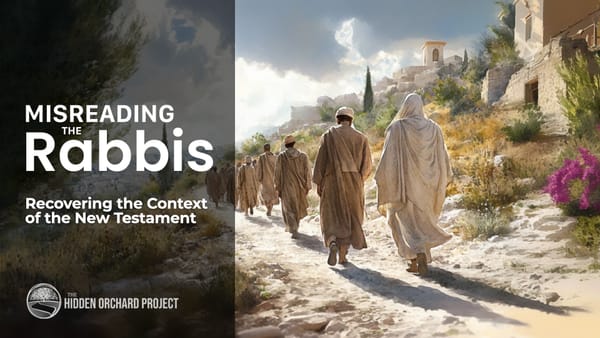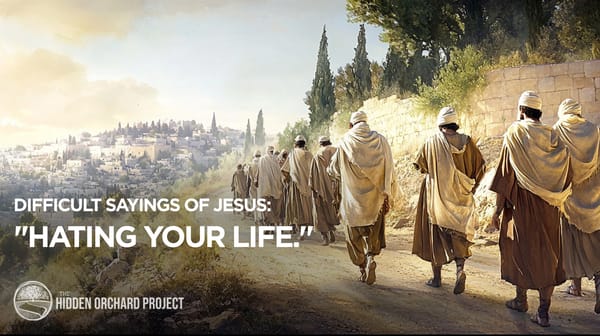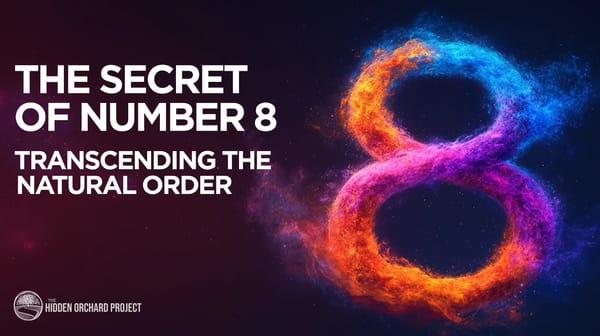Two Messiahs: the Son of David, and Son of Joseph
One of Judaism's most mysterious and guarded concepts is the concept of the twin Messiahs. As a result, it can be safely said that most people have derived their idea of Messiah largely from the various views within Christian theology.

One of Judaism's most mysterious and guarded concepts is the concept of the twin Messiahs. As a result, it can be safely said that most people have derived their idea of Messiah largely from the various views within Christian theology.
As widespread as the Christian model is in our time, it appears that the New Testament authors were privy to the deeper Jewish tradition, which understood a redemption process involving (2) Messianic figures. They have been referred to as; Messiah son of Joseph, and Messiah son of David.
The few Talmudic references to the Josephic Messiah¹ mark a distinction from the Davidic Messiah and simultaneously allude to a deeper tradition between the closed doors of the mystical tradition.
In Jewish tradition, these two Messiah figures play their unique part through the unfolding of time, yet, they work together like two wings of the same bird.
As a result, often when Christians and Jews debate the specifics of Messianism - both presuppose vastly different traditions, expectations, and conceptualizations of the word "Messiah"².
Messiah son of David
Though we will not speak of the Davidic Messiah much in this article, we can point to a few distinctions that will be valuable. The Davidic Messiah is generally expected to usher in the final redemption. As a result, Messiah, son of David, is most commonly referred to as King Messiah.
As told by the prophets, all of the oppression and subjugation of the Jewish people will end somewhat abruptly when Messiah ben David arrives - establishing his kingdom from Jerusalem. This will be enabled by the slow and steady preparation laid out by the Josephic Messiah, as we will explore below.
The New Testament seems to capture this expectation, with many calling Jesus the "Son of David". Nevertheless, Jesus seems to distance himself from this title, and the ensuing expectation, many times.
For instance, even after the resurrection³, when asked if he would overthrow the Romans, removing the yoke of their oppression, he directs them to a future timeline, affirming that this was not yet scheduled to happen.
This is in accordance with Rabbinic tradition. In one source, we read:
"Messiah ben Joseph, when he comes, does not come in order to establish his own dynasty, rather he comes to re-establish the Davidic dynasty. He will even sacrifice his own life in order to accomplish this. His blood will atone for the sins of the Jewish people. His atonement will take the form of the Davidic dynasty being restored to the Jewish people as an everlasting Kingdom.”
Shelah, Shnei Luchot HaBrit, Vayeshev-Miketz - Yayigash, Rabbi Isaiah Horowitz
Messiah son of Joseph
Ultimately, the Josephic Messiah prepares the way for the arrival of the Davidic Messiah. Largely, this work helps move the world towards global awakening by sparking an awakening to repentance. This idea can be found in the Gospels through the charge to "Repent, for the kingdom is at hand."
During his time, much of the work of the Josephic Messiah is concealed from public view. For a number of reasons, this allows him to silently shoulder the debts accrued by the transgressions of the people of Israel. This is largely why it is the Messiah, son of Joseph, who bears the name "the Suffering servant".
Though this idea is hotly debated by Christians and Jews, the mystical writings confirm that this important work will continue in the time leading up to the final redemption⁴. In this way, the two branches essentially become one.
One example from the Zohar, we can see this idea connected to Isaiah 53.
When they tell the Messiah about the suffering of Israel in exile and about the wicked among them who do not seek to know their Lord, he weeps aloud over the wicked, as it is written: But he was wounded for our sins, crushed for iniquities (Isaiah 53:5)
- Zohar Vayekel 2:212a
The Zohar continues:
The Messiah then enters that chamber and calls for all the illnesses, all the pains, and all the sufferings of Israel to come upon him, ad they all do so... As it was written, “Surely our [sicknesses] He Himself bore, and our sorrows He carried. (Isaiah 53:4)”
- Zohar Vayekel 2:212a
Some Rabbis discuss that the Josephic Messiah will not be oriented to the people of Israel at all. Instead, his work will begin to plant the seeds of thought, teaching the nations about G_D, awakening them, and slowly moving them away from idolatry.
"Messiah ben Joseph's primary responsibility is with the Goyim (the Nations)". ~ Rav Yitzhak Ginsburgh
Like the Egyptian persona Joseph took on in Egypt, "Tophnat Paneach", this disguise afforded him an opportunity to help teach and bring grain, a euphemism for Torah, to the nations. On this tradition, we read:
Tzophnat Paneach [whose name means] "One who explains what is hidden." This was said about Joseph, and it is one of the missions of Messiah son of Joseph that in every generation he explains the hints in the Torah, especially as the footsteps of Messiah come nearer, as is known."
- Kol HaTor 2:122
More on this pattern can be found in the book, "The Secrets of the Redemption⁵" written by Rabbi Moshe Chaim Luzzatto. It is an excellent source that organizes the tradition, describing the process and the work of the Josephic and the Davidic Messiahs.
The Son of Joseph
The New Testament seems to go out of its way to leave hints for an audience familiar with them. In Luke, the following statement is made after Jesus reads a particularly prophetic passage from Isaiah in the synagogue service:
Then he rolled up the scroll, gave it back to the attendant, and sat down. The eyes of everyone in the synagogue were fixed on him. Then he began to tell them, “Today this scripture has been fulfilled even as you heard it being read.” All were speaking well of him, and were amazed at the gracious words coming out of his mouth. They said, “Isn’t this Joseph’s son? (ben Yoseph)” - Luke 4:20-22
Joseph takes on a new dimension in this light. Further, it is interesting to note Jesus's grandfather's name was Jacob⁶, thus creating another connection to Jacob and Joseph from the Torah. This is noteworthy as the pattern for the Josephic Messiah is derived from a deep, often mystical⁷ reading of the narrative surrounding Joseph in Genesis.
The list of similarities is quite extensive, yet, here are a few. Both Joseph and Jesus were:
- Hated by their brothers
- Shepherds (thematically)
- Handed over to the nations
- Overcame extreme temptation
- Began their primary mission at age 30
- Sold by Judah for silver
- Oriented towards the nations
- Re-emerged after being thought dead
- Their uniqueness was not recognized or was even concealed from their brothers
- and many more.
Concealed Messiah
As stated above, the necessity of concealment is an important factor in the mission of the Josephic Messiah. It is precisely this concealment that allows him to work behind the scenes.
Like Joseph, who appeared as the Egyptian viceroy, "Tzophnat Paneach" - so too, Yeshua - is known to most by the non-Jewish name, "Jesus". Historically, there are many more similarities when considering how both figures have been predominantly orientated toward the nations.
Kol ha Tor (The Voice of the Turtledove)
In 1968, the book "Kol HaTor" ("The Song of the Turtledove") was published after centuries of its own concealment from the public. In this phenomenal but extremely complex work, the teachings of the Vilna Gaon⁸ were made available to the public.
Before this release, much of this tradition had remained locked within the Rabbinic oral tradition, out of the lens of academic scholarship and outside eyes.
One of Messiah ben Joseph's most notable trademarks is that his mission goes largely unnoticed. Though unfortunate, this serves a deeper purpose in the Kabbalah⁹. We read:
“Joseph recognized his brothers, but they did not recognize him — This is one of the traits of [Messiah ben] Yoseph not only in his own generation, but in every generation, i.e., that Messiah ben Yosef recognizes his brothers, but they do not recognize him.
- Kol HaTor 2:39
Though a common name in the first century, the name Yeshua is derived from the word for 'Salvation'. In the book Kol HaTor, we read;
"As is known, whenever the term "salvation" appears, it connotes that characteristic of Messiah ben Joseph"
- Kol HaTor 2:2
One final thought
Looking at the world today, it does not appear that Yeshua has fulfilled the role of the Davidic Messiah. However, a new understanding emerges when we understand the role of Messiah, son of Joseph. Perhaps this gives reason to explore a new perspective of what the New Testament authors were trying to communicate.
As we look at these writings with new eyes, we also have the advantage of watching history play out over the last 2,000 years. It is difficult to find another Jew by whom the nations have come to learn about Torah and monotheism.
Perhaps this was part of Divine Providence, after all?
Notes:
¹ ie: Sukkah 52
² https://www.thehiddenorchard.com/messiah/
³ Acts 1:6
⁴ https://www.thehiddenorchard.com/why-cant-christians-and-jews-agree-on-isaiah-53/
⁶ Matthew 1:16
⁷ https://www.thehiddenorchard.com/peshat-pardes/
⁸ Rabbi Eliyahu of Vilna - https://www.jewishvirtuallibrary.org/rabbi-eliyahu-of-vilna-the-vilna-gaon
⁹ https://www.thehiddenorchard.com/understanding-the-klippah/




